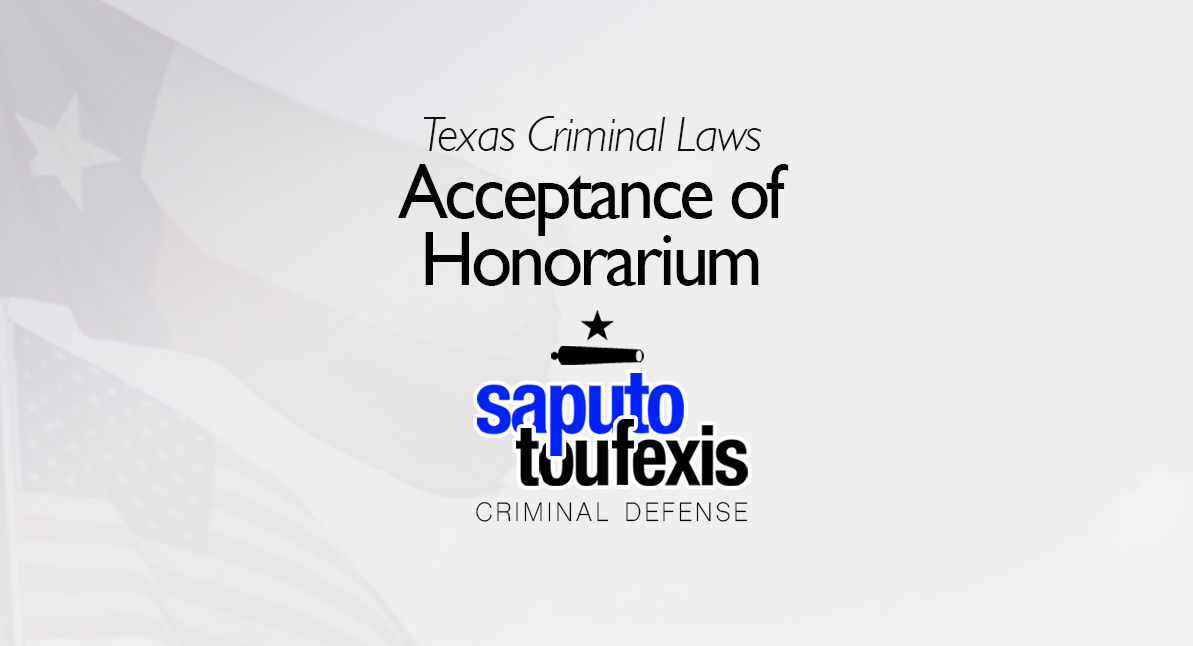The Texas Acceptance of Honorarium law prohibits public servants from soliciting or accepting payments in exchange for services that are requested only because of their status as a public servant.
FAQs about the
Acceptance of Honorarium law in Texas
- What is the current Texas law about Acceptance of Honorarium?
- What is the penalty for a Texas Acceptance of Honorarium offense?
- How can I be charged with an Acceptance of Honorarium offense in Texas?
- What is the statute of limitations for Acceptance of Honorarium in Texas?
- Can you get probation for Acceptance of Honorarium in Texas?
- What level of crime is Acceptance of Honorarium in Texas?
This law is a comapnion law to the Bribery offense in Texas. However, unlike Bribery, this law only applies to public servants. In addition, the Acceptance of Honorarium law applies to a different (or complimentary) type of grease-palming. Whereas Bribery might encompass official positions and voting, Acceptance of Honorarium would cover things like getting paid for a fake job.
Have you been charged with Acceptance of Honorarium? Contact us today to discuss legal representation.
or Text or Call (888) 239-9305
Acceptance of Honorarium makes it illegal for public servants to ask for money for services that they would not have rendered but for their public position.
The Texas legislature codified this criminal offense in Texas Penal Code Section 36.07. The legislature did not update this law in 2025. In fact, this law has not been amended since 2011.
The Penal Code classifies the Texas Acceptance of Honorarium law under Title 8 “Offenses Against Public Administration,” Chapter 36 “Bribery And Corrupt Influence.” Learn more about the Texas offense of Acceptance of Honorarium below.
What is the current Texas law about Acceptance of Honorarium?
AV Preeminent Texas lawyer Paul Saputo provides the current law defining Acceptance of Honorarium in Penal Code Section §36.07, as follows:[1]
(a) A public servant commits an offense if the public servant solicits, accepts, or agrees to accept an honorarium in consideration for services that the public servant would not have been requested to provide but for the public servant’s official position or duties.
The law also states[2] that this subsection (a) offense:
does not prohibit a public servant from accepting transportation and lodging expenses in connection with a conference or similar event in which the public servant renders services, such as addressing an audience or engaging in a seminar, to the extent that those services are more than merely perfunctory, or from accepting meals in connection with such an event.
Transportation, lodging, and meal, as described above, are not political contributions.[3]
What is the penalty for a Texas Acceptance of Honorarium offense?
A conviction for Acceptance of Honorarium in Texas is punished as a Class A misdemeanor,[4] with a maximum possible fine under Texas state law of up to $4,000 and jail time of up to one year.
How can I be charged with an Acceptance of Honorarium offense in Texas?
You can be charged with Acceptance of Honorarium in Texas if the state’s attorneys believe that each of the elements of §36.07(a) as described in the section above have been met.
What is the statute of limitations for Acceptance of Honorarium in Texas?
As a misdemeanor, Acceptance of Honorarium charges have a two-year limitations period.[5]
Can you get probation for Acceptance of Honorarium in Texas?
The Texas Code of Criminal Procedure allows both judges and juries to grant probation for Acceptance of Honorarium, and judges are also allowed to accept deferred adjudication plea deals.[6]
What level of crime is Acceptance of Honorarium in Texas?
The Penal Code classifies Acceptance of Honorarium as a Class A misdemeanor.
Learn more about the penalty range for this offense in the section above.
Legal References:
^1. Texas Penal Code §36.07. This law is current as of 2025.^2. Texas Penal Code §36.07(b)^3. Texas Penal Code §36.07(b-1)^4. Texas Penal Code §36.07(c)^5. See Code of Criminal Procedure 12.02(a)^6. See Chapter 42A, Texas Code of Criminal Procedure, Art. 42A.054, Art. 42A.056, Art. 42A.102










